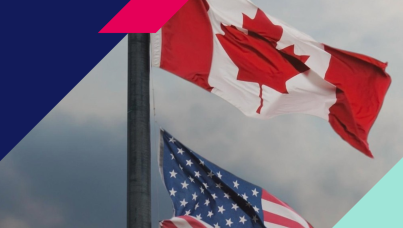MNP Debt Index Rebounds From All-Time Low as Interest Rates Stabilize, but Half (50%) Feel the Worst is Yet to Come
Toronto, ON, April 11, 2023 — The quarterly MNP Debt Index has rebounded to 89 points, up 12 points from the all-time low recorded last quarter. Canadians’ confidence with their personal debt reflects the stabilization in the Bank of Canada key interest rates. However, consumer confidence remains lower than recorded from 2021 and earlier, indicating Canadians are still feeling the effects of inflation and affordability, while at the same time many are worried that the worst of this economic cycle is yet to come.
Savings Reduced… Essentials Becoming More Expensive?
Consistent with last quarter, nearly half (46%, +1) of Canadians report that they are $200 away or less from not being able to meet all of their financial obligations, including three in ten (30%, unchanged) who say they already don’t make enough to cover their bills and debt payments. While insolvency rates remain consistent, the average amount of money that Canadians have left over at the end of the month has dropped slightly to $787, down $64 from the previous quarter, as Canadians are likely to continue to be more cautious about their spending and reconsidering as half (50%) still believe the worst part of the economic cycle has yet to come. As Canadians are likely to be still concerned with the economic crisis by saving more money than the have in previous years, the decrease could be the effect of inflation making essential items more expensive.
Men (-$218) and Canadians aged 18-34 (-$276) and 35-54 (-$131) saw a decrease in month-end finances, women (+$73), those aged 55+ (+$143) or with $60K to less than $100K household income (+$62) were the only segments measured with increases in month-end finances. Despite the sizable decrease, however, men still have significantly more money leftover at month’s end – as do those aged 55+ and those with a household income greater than $60K per year.
Canadians Feeling More Confident with Debt
Canadians’ net personal debt rating has increased notably to 24 points, a twelve-point increase from last quarter. The shift is a result of more Canadians rating their personal debt situation as ‘excellent’ (40%, +9) and fewer are rating it as terrible (15%, -5).
When Canadians were asked about their current debt situation compared to one year ago, a quarter perceive their current debt situation to be better (25%, +4). In addition, fewer Canadians have rated their current debt situation as much worse compared to a year ago, a decrease of 5 points from the previous quarter (15%). Canadians were asked to forecast their expected debt situation year from now, slightly more Canadians expect their debt situation to improve (31%, +3) and fewer believe it will worsen (13%, -4), perhaps believing that interest rates could decline in the meantime.
Interest Rates Settle and More Canadians are Prepared for Future Hikes
With the Bank of Canada interest rates stabilizing after rapid increases, Canadians are now feeling much better about their ability to absorb interest rates increases. When asked their ability to absorb an interest rate increase of 1 percentage point, a quarter (24%, +4) say they are much better equipped to absorb this increase, while fewer (21%, -5) say their ability to deal with this increase has worsened. The question was rephrased to ask their ability to absorb an interest rate increase of an extra $130, in which a fifth (21%, +5) say their ability to absorb this increase is much better, while 3 in 10 (30%, -6) say it is much worse.
Over half of Canadians are confident with their ability to cover all living/family expenses in the next year without going further into debt (55%, +4). Less than half of Canadians are concerned about their current level of debt (46%, -1) with fewer saying they regret the amount of debt they’ve taken on in life (43%, -6). Despite more Canadians being confident to manage their debt, there are still three in five Canadians that agree they are concerned about the impact of rising interest rates on their financial situation (61%, -1), underscoring the anxieties that the high interest-rate environment has brought.
Canadians were asked to reflect on increasing interest rates and notably fewer Canadians say they are more concerned about their ability to pay their debts (60%, -4) than the previous quarter. Furthermore, fewer Canadians say that they’re already beginning to feel the effects of interest rate increase (65%, -3), while most continue to be more careful with how they spend their money (83%, -4), even if it has declined slightly. As Canadians are becoming less concerned with interest rate hikes (given the decreasing likelihood of further increases), about half of Canadians still say that if interest rates go up much more, they will be in financial trouble (57%, -2)
Women and Canadians ages 35-54 are most likely to agree they will be more careful with how they spend their money due to rising interest rates. Canadians with less than $40K household income and those ages 18-34 and 35-54 are most likely to feel the effects of interest rate increases, concerned with their ability to repay their debts, will be in financial trouble, and fear that rising interest rates moving them close towards bankruptcy.
Perception of Canadian Economic Crisis
As noted earlier, when Canadians were asked about the current economic condition in Canada and how it impacted their personal financial situation, half believe (50%) the worst part of the economic cycle is yet to come. However, a third (35%) believe we are currently experiencing the worst of the economic crisis leaving fewer optimistic about the future with 15% stating the worst is behind us.
Reflecting on the last six months, more than half of Canadians (57%) said that the economic conditions were about what they expected, while a third (33%) say it was worse than they expected and only 1 in 10 (10%) say it was not as a bad as they were expecting.
Men, those ages 18-34, and Quebecers are also more likely to say the economic conditions within the last six months were not as bad as they expected and are most likely to state the worst is behind us. Atlantic Canadians were most likely to say the economic conditions was worse than what they were expecting, and that we have yet to experience the worst part of the economic cycle.
About the Study
These are some of the findings of an Ipsos poll conducted between March 7-14 2023, on behalf of MNP LTD. For this survey, a sample of 2,004 Canadians aged 18 years and over was interviewed. Weighting was then employed to balance demographics to ensure that the sample's composition reflects that of the adult population according to Census data and to provide results intended to approximate the sample universe. The precision of Ipsos online polls is measured using a credibility interval. In this case, the poll is accurate to within ±2.5 percentage points, 19 times out of 20, had all Canadian adults been polled. The credibility interval will be wider among subsets of the population. All sample surveys and polls may be subject to other sources of error, including, but not limited to coverage error, and measurement error.
For more information about the MNP Consumer Debt Index, please visit mnpdebt.ca/CDI.
For more information on this news release, please contact:
Sean Simpson
Senior Vice President, Canada, Public Affairs
[email protected]
Raymond Vuong
Account Manager, Canada, Public Affairs
[email protected]
About Ipsos
Ipsos is the world’s third largest market research company, present in 90 markets and employing more than 18,000 people.
Our passionately curious research professionals, analysts and scientists have built unique multi-specialist capabilities that provide true understanding and powerful insights into the actions, opinions and motivations of citizens, consumers, patients, customers or employees. We serve more than 5000 clients across the world with 75 business solutions.
Founded in France in 1975, Ipsos is listed on the Euronext Paris since July 1st, 1999. The company is part of the SBF 120 and the Mid-60 index and is eligible for the Deferred Settlement Service (SRD).
ISIN code FR0000073298, Reuters ISOS.PA, Bloomberg IPS:FP www.ipsos.com



